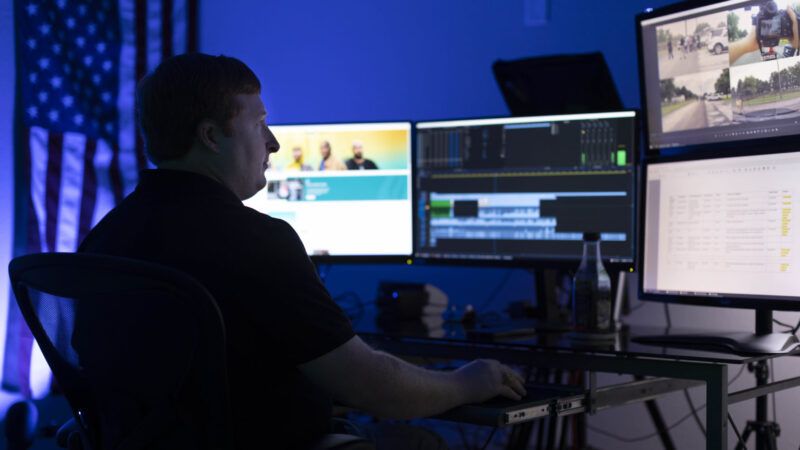Citizen Journalist Barred From Press Conference Can Sue Texas Sheriff for Violating His Rights, Judge Rules
The decision is a reminder that independent reporters are still protected by the same First Amendment as journalists in legacy media.

A citizen journalist who was excluded from a press conference because the police deemed him not "media" had his constitutional rights violated and can sue, a judge ruled this month. The decision serves as a reminder that a job in legacy media does not entitle you to a stronger set of free speech protections.
Justin Pulliam—whose YouTube channel Corruption Report does not shy away from criticizing law enforcement—was removed from a Texas press conference in July 2021 at the behest of Fort Bend County Sheriff Eric Fagan, who told a deputy to keep Pulliam away under threat of arrest. That violated the First Amendment, concluded U.S. Magistrate Judge Andrew M. Edison, in such a clear way that Fagan should not receive qualified immunity, the legal doctrine that dooms federal lawsuits against state and local government employees if the way those public servants allegedly violated the law was not "clearly established" at the time of the violation.
That Fagan's conduct was unconstitutional should have been obvious to him, said Edison. "At the outset, I must address the threshold issue of whether the activities undertaken by Pulliam—a citizen who posts opinion-laden news coverage of law enforcement on social media channels—are protected by the First Amendment," he wrote in an opinion published by the U.S. District Court for the Southern District of Texas. "The answer is, unequivocally, yes."
As one of the most powerful government agents in his community, Fagan should have, in theory, known this. But the notion that citizen journalists—independent reporters not employed by an outlet—are less legitimate and thus entitled to a watered-down version of the First Amendment is neither new nor limited to people's perception of Pulliam.
It is one of the most relevant media debates currently playing out, in a landscape where legacy media's influence is being supplanted in part by viral social media stars. Another citizen journalist—Priscilla Villarreal of Laredo, Texas, which is located 4.5 hours from Fort Bend County—is asking the Supreme Court to hear her case after local police arrested her in response to some of her reporting. Villarreal runs a massively popular Facebook page where she live streams her journalism, often directly from crime scenes and traffic accidents, and where she has often been critical of law enforcement.
In 2017, Villarreal published a story on a Border Patrol agent who had committed suicide and another story on a family involved in a fatal vehicle accident after confirming the information with someone in the Laredo Police Department. That same department then arrested her by leveraging an obscure Texas statute that criminalizes soliciting nonpublic information if the person asking intends to gain from it. She gained, police alleged, by getting popular on Facebook.
"They were just looking for something to arrest me," she says in a recent documentary produced by Reason. "Because I was exposing the corruption, I was exposing them being cruel to detainees….They were doing things they weren't supposed to."
But Villarreal has not had good fortune in litigation. Earlier this year, the U.S. Court of Appeals for the 5th Circuit—the same circuit Pulliam is in—ruled 9–7 that it was not obviously unconstitutional when the police arrested her for her reporting. In the majority opinion, Judge Edith Jones made a distinction between Villarreal and "mainstream, legitimate outlets."
Pulliam was arrested as well, in December 2021, and charged with interfering with police duties after he videoed police at a mental health call. One wonders if that would have happened if he worked for, as Jones says, a "legitimate outlet."


Show Comments (58)